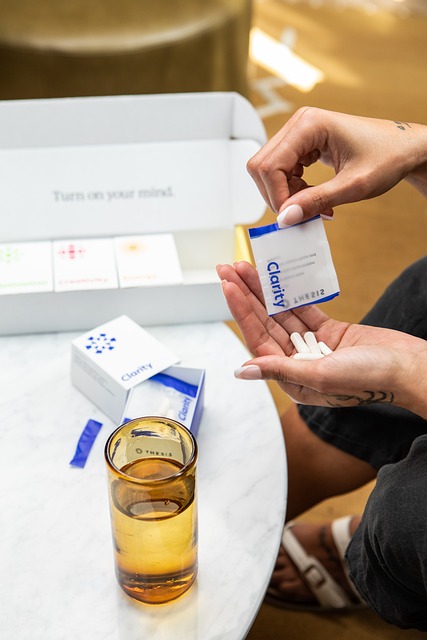Anti-inflammatory therapies, including stem cell, PRP (Platelet-Rich Plasma), and peptide treatments, offer innovative solutions for managing chronic inflammation and associated pain. These holistic approaches, rooted in regenerative medicine, modulate the body's inflammatory response, promote healing, and provide natural, personalized pain relief options. Conventional anti-inflammatory drugs, while effective short-term, come with side effects due to non-specific targeting. Advanced therapies focus on precise, targeted management of inflammation, leveraging regenerative medicine for tissue repair and sustainable pain relief without adverse effects. Future prospects are promising with peptides, stem cells, and PRP therapy, under the umbrella of regenerative medicine for inflammation, aiming to transform pain management and improve patient outcomes.
In today’s digital era, understanding inflammation is more crucial than ever. As a testament to its impact, chronic inflammation contributes to various health issues, from joint pain to tissue damage. This article delves into innovative anti-inflammatory therapies offering revolutionary solutions for pain relief and healing. We explore traditional vs. cutting-edge approaches, including stem cell therapy, PRP therapy, and peptide therapy, emphasizing holistic inflammation management. By highlighting advanced pain relief treatments and regenerative medicine, we unveil promising future prospects in the realm of inflammation control.
- Understanding Inflammation: Unveiling the Body's Response
- Traditional vs. Innovative Anti-Inflammatory Approaches
- Advanced Therapies: A Holistic Approach to Inflammation Management
- Exploring Future Treatments: Peptides, Stem Cells, and Beyond
Understanding Inflammation: Unveiling the Body's Response

Inflammation is a complex biological response designed to protect and heal our bodies after injury or infection. It’s a crucial process that involves immune cells, blood vessels, and molecules like cytokines. While short-term inflammation helps fight off pathogens and initiate healing, chronic inflammation can lead to significant health issues, including persistent pain and tissue damage. This is where innovative anti-inflammatory therapies step in as advanced pain relief treatments, offering new hope for managing conditions once thought incurable.
From stem cell therapy for inflammation to PRP (platelet-rich plasma) therapy for inflammation and peptide therapy for inflammation, holistic inflammation management has seen remarkable advancements in regenerative medicine for inflammation. These cutting-edge approaches aim to modulate the body’s inflammatory response, reduce damage, and promote tissue regeneration. By tapping into the body’s inherent healing mechanisms, these anti-inflammatory therapies offer a more natural, personalized approach to pain relief and optimal healing.
Traditional vs. Innovative Anti-Inflammatory Approaches

In the realm of managing inflammation and pain relief, a shift from traditional to innovative approaches is gaining traction. Conventional anti-inflammatory drugs, while effective in the short term, often come with a host of side effects due to their non-specific targeting and global suppression of inflammatory responses. This has led to a surge in interest for advanced pain management techniques that offer more precise, targeted, and holistic inflammation management.
Innovative therapies such as stem cell therapy for inflammation, PRP (Platelet-Rich Plasma) therapy for inflammation, and peptide therapy for inflammation are transforming the landscape of anti-inflammatory treatments. These advanced pain relief treatments leverage the body’s own healing mechanisms by promoting regenerative medicine for inflammation. By stimulating tissue repair and modulating the inflammatory response, these novel approaches promise more sustainable pain relief and accelerated healing without the adverse effects commonly associated with traditional medications.
Advanced Therapies: A Holistic Approach to Inflammation Management

In recent years, a paradigm shift has occurred in managing chronic inflammation and pain with the advent of advanced therapies. Traditional methods often focused on suppressing symptoms, but modern approaches like stem cell therapy for inflammation, PRP (platelet-rich plasma) therapy for inflammation, and peptide therapy for inflammation offer a more holistic inflammation management strategy. These innovative treatments not only provide advanced pain relief but also promote healing at the cellular level.
Regenerative medicine for inflammation leverages the body’s inherent healing capabilities by utilizing its own cells and growth factors. Stem cells, known for their versatility, can differentiate into various cell types, facilitating tissue repair and reducing inflammation. PRP therapy enhances natural healing processes by injecting concentrated platelets rich in growth factors, stimulating tissue regeneration and reducing pain. Peptide therapy, with its precise molecular targeting, modulates inflammatory pathways, offering a highly specific and effective approach to managing chronic inflammation. These advanced therapies represent a significant step forward in holistic inflammation management, promising lasting relief and improved quality of life for patients suffering from various inflammatory conditions.
Exploring Future Treatments: Peptides, Stem Cells, and Beyond

The future of anti-inflammatory therapies looks promising with emerging techniques such as peptides, stem cells, and PRP (Platelet-Rich Plasma) therapy taking center stage in the quest for advanced pain relief treatments. Peptides, small chains of amino acids, are being explored for their ability to modulate inflammatory responses, offering potential for holistic inflammation management.
Stem cell therapy for inflammation is another frontier, leveraging the regenerative properties of stem cells to repair and replace damaged tissues. PRP therapy for inflammation harnesses the body’s natural healing mechanism by utilizing concentrated platelets to stimulate tissue regeneration and reduce inflammation. These innovative approaches, under the umbrella of regenerative medicine for inflammation, hold great promise in transforming the way we manage pain and promote healing.
In conclusion, the quest for effective anti-inflammatory therapies has led to a remarkable evolution in medical science. By understanding the intricate mechanisms of inflammation, we’ve transitioned from traditional approaches to exploring innovative solutions like peptide therapy, stem cell therapy, and PRP therapy. These advanced treatments offer holistic inflammation management, revolutionizing pain relief and healing. As research continues, these cutting-edge methods hold immense potential for future patients seeking regenerative medicine for various inflammatory conditions.
